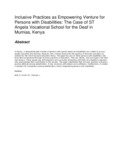| dc.contributor.author | Bota, K | |
| dc.contributor.author | Sichari, M | |
| dc.contributor.author | Ilolanga, L | |
| dc.date.accessioned | 2021-12-15T12:01:16Z | |
| dc.date.available | 2021-12-15T12:01:16Z | |
| dc.date.issued | 2020-03-31 | |
| dc.identifier.govdoc | https://www.iiste.org/Journals/index.php/JEP/article/view/51991 | |
| dc.identifier.uri | https://doi.org/10.7176/JEP/11-9-05 | |
| dc.identifier.uri | http://ir-library.mmust.ac.ke:8080/xmlui/handle/123456789/1860 | |
| dc.description.abstract | n Kenya, a disproportionate number of persons with special needs and disabilities are unable to access quality education and training. However, this is being reduced by the practice of inclusive education as outlined by the 2018 Inclusive Education Policy. The paper focuses on three persons with disabilities who have been empowered through inclusive practices in Education. They are: Benta, Julia and Agnes (not their real names). These people are self-employed and successful interacting with their non-disabled customers who acknowledge their contribution to the society. The paper established that inclusive practices enhances positive attitude among stakeholders. It also increases self-esteem and confidence. Furthermore, it creates a situation for comparison among stakeholders, hence empowering persons with disabilities | en_US |
| dc.language.iso | en | en_US |
| dc.publisher | Journal of Education and Practice | en_US |
| dc.subject | Inclusive, Practices, Empowering, Venture, Persons, Disabilities | en_US |
| dc.title | Inclusive Practices as Empowering Venture for Persons with Disabilities: The Case of ST Angela Vocational School for the Deaf in Mumias, Kenya | en_US |
| dc.type | Article | en_US |

